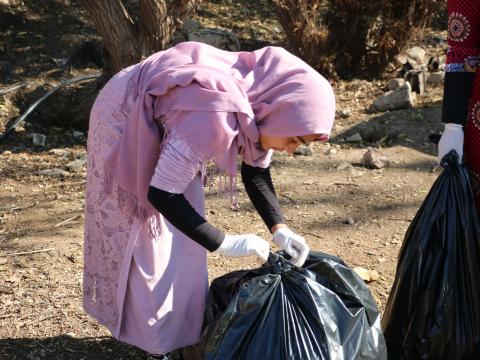Clean house clean life

When surrounded by dirt and garbage, not knowing the right hygiene practices can lead to an unpleasant life and illness. With the support of UNICEF, BPRM and the government of Canada, World Vision is leading cleaning campaigns targeting around 800 families in Bekaa. Its main objectives are increasing the refugees' knowledge around protecting themselves from diseases that may occur due to the improper disposal of solid waste, motivating them to feel more responsible about their environment’s cleanliness, as well as promoting the importance of maintaining good health through practising correct hygiene practices. The activity also aims to support women to encourage their children to adopt good hygiene practices, particularly regarding not throwing solid waste randomly in addition to emphasizing the necessity of regular cleaning inside and outside the tents.
Hamida is a 23-year-old mother living in one of the informal tented settlements (ITS) in Bar Elias- Bekaa. She participates regularly in the cleaning campaigns "These activities made a big difference in our daily routine", she explains, "We received several cleaning advice which we did not consider before like the importance of cleaning our water tanks."
At the age of 20, Ghufran finds herself sometimes in need of support in matters related to her household’s cleanliness. When World Vision’s WASH team approached the residents of the settlement offering support and tips for a cleaner life, she was thrilled to take part in the activities. Ghufran says, "I was thankful to attend the sessions. They taught us everything from the proper way of handwashing to cleaning around our tents and the dangers of germs."
World Vision’s hygiene promoter, Rana, noticed the impact the cleaning campaigns had on the refugee women in the Bekaa. "You can see a big difference in the ITS between the first day and now. We also noticed how women interact with us and how attentive they are in these sessions. We are trying to cover the different aspects of a woman's daily life from solid waste, food poisoning to practising correct hygiene practices."